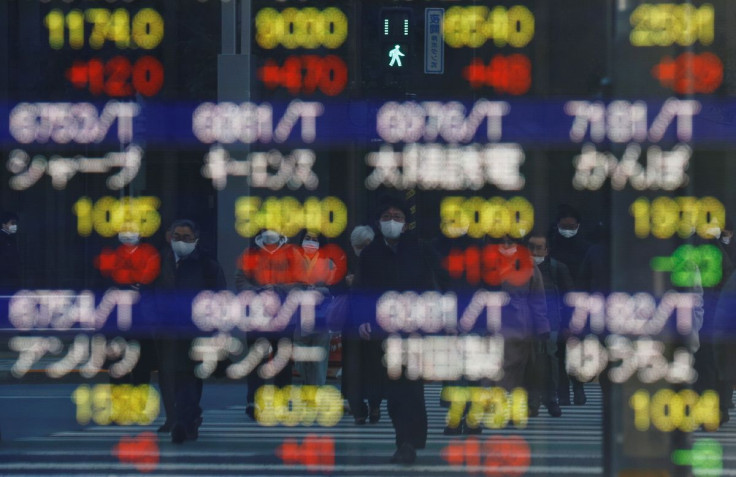Stocks Climb, U.S. Treasury Yields Slip As U.S. Inflation Data Fails To Surprise

World stocks edged higher after a wobbly start on Tuesday, while U.S. Treasury yields slipped as data showing a jump in U.S. inflation was in line with expectations.
The U.S. consumer price index rose 1.2% last month, the biggest increase in 16-1/2 years and cementing the case for a 50 basis points interest rate hike from the Federal Reserve next month.
However, the benchmark 10-year Treasury yield was last down 7.2 basis points at 2.710%, its first decline in eight sessions, as the inflation number had been priced in and also reflecting the market's unease that an aggressive policy response to inflation from the Federal Reserve could undermine economic growth.
"You've got a relatively mature move in terms of yields, you've got a bias towards a lot of shorts out there already, which means you have to find a new marginal short, and you've got this small but relatively vocal community saying maybe that is the top for CPI and maybe it could roll over," said Huw Roberts, head of analytics at Quant Insight.
"That all conspires to give you a 'buy the rumour, sell the fact' type of price action," Roberts added.
Oil prices jumped more than 6% as Shanghai's relaxation of some COVID-19 restrictions eased concerns about reduced Chinese demand and after OPEC warned it would be impossible to replace potential supply losses from Russia.[O/R]
On Wall Street, the Dow Jones Industrial Average rose 0.54% and the S&P 500 gained 0.88%.
The Nasdaq Composite added 1.45% while the pan-European STOXX 600 index lost 0.53%.
MSCI's gauge of stocks across the globe was up 0.44%.
"Markets have decided that central banks are late and need to do more to tame inflation, and moderate volatility in equities is not enough to stop this," said Nordea chief analyst Jan von Gerich. "The reason for the wobble in equity markets is higher rates and geopolitics."
While U.S. 10-year Treasury yields pulled back from their highs, they are up almost 45 basis points so far this month.
More disconcerting for equities is the move in real or inflation-adjusted yields, with the yield on the 10-year U.S. Treasury Inflation-Protected Securities (TIPS) approaching 0%.
In Europe, German Bund yields climbed to almost 0.88%, their highest level since 2015, British gilt yields rose to fresh multi-year highs.
Germany's ZEW economic research institute said its economic sentiment index fell to -41.0 points from -39.3 in March, declining less than expected.
CHINA MARKETS GAIN GROUND
The dollar index , a measure of the greenback's value against six peers, fell 0.144%, after earlier in the week touching its highest level in almost two years.
Japan's yen, however, has been hurt by the Bank of Japan's commitment to maintaining ultra-easy policy even as the likes of the Fed embark on tightening monetary policy.
Latest warnings from Japanese policymakers, with Prime Minister Fumio Kishida stating on Tuesday that rapid currency moves are undesirable, failed to shore up the yen, which has shed over 3% this month.
"Markets at this point are not sure policymakers are genuinely inclined to intervene on the yen and that's why we have most likely seen a limited impact," said James Lord, global head of FXEM Strategy at Morgan Stanley. "Typically verbal intervention doesn't have much impact on currency markets, and that's not specific to the yen."
The euro was down 0.02% to $1.0881, unable to hold on to gains from a mini-relief rally on Monday, after French leader Emmanuel Macron beat far-right challenger Marine Le Pen in the first round of presidential voting.
China's markets and oil prices gained ground as signs emerged that some of the COVID-19 restrictions were starting to ease in financial hub Shanghai.
An easing of China's regulations on the gaming sector also gave investors heart after a multi-year crackdown on parts of the country's technology industry.
China's blue chip CSI300 Index dipped into negative territory mid-session but roared back in the afternoon to rally almost 2%.
U.S. crude was up 6.54% to $100.46 per barrel and Brent was at $104.59, up 6.2% on the day.
The Organization of the Petroleum Exporting Countries warned on Monday that it would be impossible to replace 7 million barrels per day (bpd) of Russian oil and other liquids exports lost in the event of sanctions or voluntary actions.
The European Union has yet to agree any embargo on Russian oil over the war in Ukraine, but some foreign ministers said the option is on the table.
© Copyright Thomson Reuters {{Year}}. All rights reserved.





















